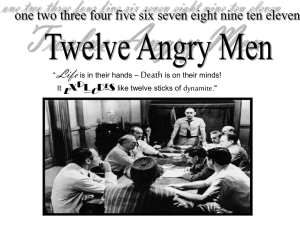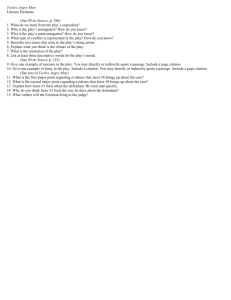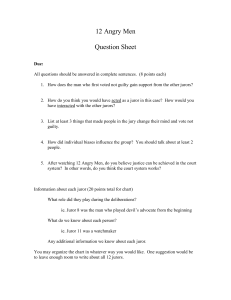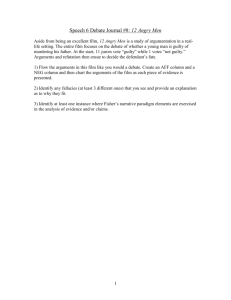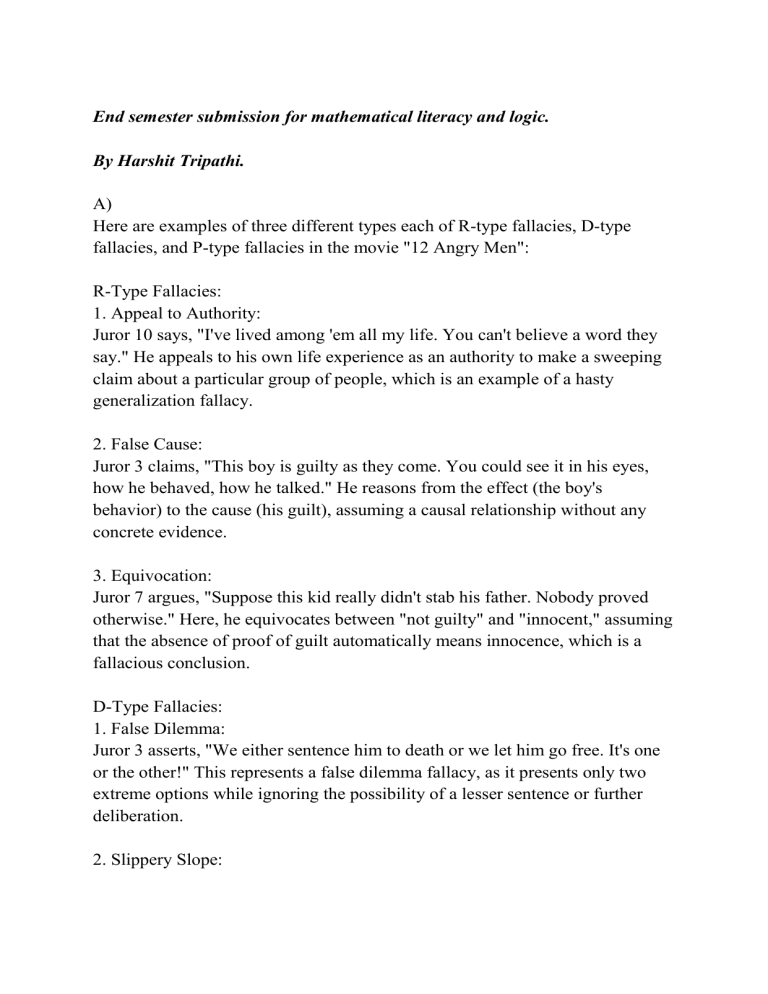
End semester submission for mathematical literacy and logic. By Harshit Tripathi. A) Here are examples of three different types each of R-type fallacies, D-type fallacies, and P-type fallacies in the movie "12 Angry Men": R-Type Fallacies: 1. Appeal to Authority: Juror 10 says, "I've lived among 'em all my life. You can't believe a word they say." He appeals to his own life experience as an authority to make a sweeping claim about a particular group of people, which is an example of a hasty generalization fallacy. 2. False Cause: Juror 3 claims, "This boy is guilty as they come. You could see it in his eyes, how he behaved, how he talked." He reasons from the effect (the boy's behavior) to the cause (his guilt), assuming a causal relationship without any concrete evidence. 3. Equivocation: Juror 7 argues, "Suppose this kid really didn't stab his father. Nobody proved otherwise." Here, he equivocates between "not guilty" and "innocent," assuming that the absence of proof of guilt automatically means innocence, which is a fallacious conclusion. D-Type Fallacies: 1. False Dilemma: Juror 3 asserts, "We either sentence him to death or we let him go free. It's one or the other!" This represents a false dilemma fallacy, as it presents only two extreme options while ignoring the possibility of a lesser sentence or further deliberation. 2. Slippery Slope: Juror 4 argues, "If we spend all this time deliberating, it will set a dangerous precedent. Cases will take forever, and justice will be compromised." He predicts a chain of negative consequences without providing evidence to support the link between extended deliberation and compromised justice. 3. Straw Man: Juror 12 says, "Look, let's not waste time. This trial was fair, and the evidence is enough to find him guilty." He simplifies the argument by creating a weaker version of the opposing view, making it easier to dismiss without addressing the points raised by the other jurors. P-Type Fallacies: 1. Hasty Generalization: Juror 9 proclaims, "People from his background tend to be violent and dangerous. It's just how they are." This hasty generalization fallacy relies on personal experience to make an overgeneralized claim about a specific group of people based on the defendant's background. 2. Appeal to Ignorance: Juror 8 argues, "There's no evidence to suggest the defendant is guilty. Therefore, we must assume he is innocent." He appeals to the lack of evidence to support his conclusion, disregarding the need for affirmative evidence to establish the defendant's innocence. 3. Bandwagon Appeal: Juror 12 exclaims, "Everybody thinks he's guilty! Why should we be the only ones who think otherwise?" This fallacy relies on the popularity of a belief to sway the argument, suggesting that the jurors should conform to the majority opinion without critically evaluating the evidence. B) Dialogues that use analogical reasoning in the movie "12 Angry Men": 1. Reasoning from Similarity (Analogical Reasoning): Juror 8 states, "Let's imagine for a moment that the defendant is innocent. Then, wouldn't it follow that someone else could have committed the crime?" He draws a comparison between the current situation and a hypothetical scenario to highlight the possibility of an alternative perpetrator. 2. Reasoning from Dissimilarity (Analogical Reasoning): Juror 4 argues, "Based on the evidence presented, the defendant's knife matches the murder weapon. Just like a fingerprint, this is strong enough to establish guilt beyond a reasonable doubt." He draws an analogy between the uniqueness of fingerprints and the uniqueness of the knife, suggesting a strong connection between the defendant and the crime. Dialogues that reason from effect to cause in the movie "12 Angry Men": 1. Reasoning from Effect to Cause: Juror 8 says, "The boy has broken relationships, struggles in school, and a difficult upbringing. These conditions can lead to desperation, which may explain his alleged involvement in the crime." He suggests that the difficult circumstances in the boy's life could have potentially caused him to engage in criminal behavior. Dialogues that reason from cause to effect in the movie "12 Angry Men": 1. Reasoning from Cause to Effect: Juror 10 asserts, "He comes from a neighborhood where violence is common. It's no surprise that he turned out to be a killer." He implies that the defendant's environment and upbringing caused him to become a murderer.

